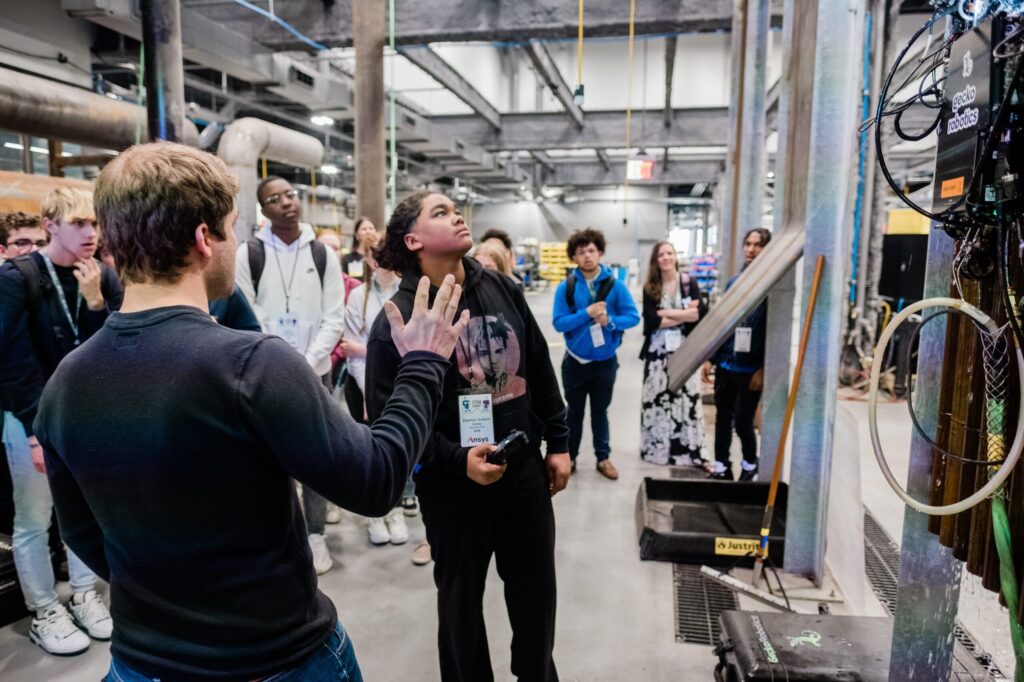As a lead program associate for the Network for Teaching Entrepreneurship (NFTE), Julianne Kasper helps students discover the world of business and build entrepreneurial skills along the way.
“At NFTE, we go into schools or community-based organizations and deliver entrepreneurship programming through a ‘train the trainer’ model,” Kasper explains. “We partner with the teachers and instructors who then carry out these proven, fully developed programs that allow students to take their business idea and run with it.”

Remake Learning sat down with Kasper to discuss the current state of entrepreneurship and the many ways it helps students build vital 21st-century skills.
Remake Learning: How do you define entrepreneurship education?
Julianne Kasper: It’s showing students how to develop a valid business idea, and then build a business plan around it. We help them explore those details that might not be the first part of their idea. And on top of teaching those concrete skills, entrepreneurship education is also about learning to think like an entrepreneur.
RL: What is an entrepreneurial mindset? How does it relate to learning more broadly?
JK: The mindset is about growing and developing critical creativity and a comfort with risk. It’s making sure students see that you have to consider competition analysis, potential markets, financial viability, and more to be successful in a business. And you may not always be comfortable with certain skills, but you can develop them. That whole process of growth is essential. When I’m training teachers to implement the program, I emphasize that it’s almost 50/50 between getting across the content and focusing on that growth mindset and perspective. Because even if a student never starts a business, that growth mindset helps them go into the world to do more creative, innovative things and be successful. It’s a huge takeaway.
RL: What does this work look like in practice?
JK: For students, it looks like taking ownership of your future. For NFTE teachers, it looks like a classroom full of engaged students who connect with real-world professionals and entrepreneurs as they think about how to solve real problems. For us, it looks like working alongside partners in a community – mostly under-resourced communities – to ensure equitable access to entrepreneurship education. If you look at in-school programs, which are the majority of our work, you’ll see our work practiced as yearlong or semester-long courses. Out-of-school programs might run for six weeks, or for about 18 hours across several weeks or just one week. But it’s intensive, all-day. Whatever the timing, it’s all about the “build, measure, learn” iterative process – students try and perhaps it doesn’t go well, so they try it a different way. Perhaps it doesn’t go well again, but it does keep improving until eventually it works. Every attempt is a success because students are learning. Once students get a sense that, ‘Oh, I really can do it, even if it doesn’t come out perfect,’ then the comfort they start to feel translates into confidence.
It can be very different from their other educational experiences. It goes beyond “learning how to do business” to include a potentially transformational learning and growth of confidence. As they move through NFTE’s programs, students translate their ideas into pitch presentations – creating and delivering the short elevator pitch and then the full pitch presentation with a PowerPoint.
RL: How have you seen entrepreneurship education impact students and teachers?
JK: One of my favorite things is when kids realize that they can do something wrong and that it can be a positive. Many teachers are very good at instilling a sense of growth mindset, though ultimately most traditional educational models depend on a student trying to be as correct as possible at all times. And so even with a really great teacher supporting you through failure, the system is really set up that failure is a bad thing. Through entrepreneurship education, kids learn the skill of “failing forward.” As they do that, we see kids come out of their shells. We work with middle and high schoolers who are very much in that sort of awkward time of life. We see teachers use these programs to build up an individual student’s confidence and also build a community of supporters. I have to give all the credit to the teachers. When you see a classroom of students erupt in applause after a very shy student has presented and pitched their idea, and they’re just all so proud of that student, you see it really has a social impact. Building up that individual competence helps you be more supportive of others.
Teachers also gain so much. One teacher told me that he saw NFTE as “an oasis” among his other prep work, because he had all the materials and support that he needed. So he could enter the classroom and just facilitate that learning. And students are really focused because they are owning the whole learning process. They were so naturally engaged that it wasn’t a struggle in his classroom. There are always challenges, of course, but he wasn’t fighting to get them to engage with the content.
RL: What challenges does entrepreneurship education face today?
JK: The teacher staffing crisis is a challenge – just getting a teacher in the classroom, and beyond that getting a strong teacher that connects to the community. Entrepreneurship is not math, science or English – it’s not the core. So much like the crisis around arts education, it’s viewed as something that can be cut. Another challenge is the silos and discontinuity between different parts of the entrepreneurial ecosystem. It’s not always easy to connect, for example, a 16-year-old who is taking the NFTE program to continuing education and business development opportunities. Across different sectors, the organizations serving different age groups and segments of the population are not always in contact or even aware of one another.
RL: What opportunities do you see for entrepreneurship education in the near future?
JK: As schools focus on their graduate profiles, there’s a huge opportunity. But there’s still that challenge in the high school environment of a lot of rigidity around what credits are needed. So there’s a need to shift the mindset of the educators and leaders to understand that things like SEL, growth and leadership are crucial. Also, we’re looking increasingly at alternative pathways. We know that going to a four-year institution is not the pathway for all of our students. I spoke recently with a charter network in eastern Pennsylvania that is starting to shift that perspective. They were very college-focused, but they’re turning to ‘what do our students want and need?’ One of the biggest things that they’re seeing is that students are asking for entrepreneurship. NFTE put out a Trends reportlast year that found the same thing: Student demand for entrepreneurship is up. And so those districts that want to be responsive to student interests have a great opportunity to really lean into that.
